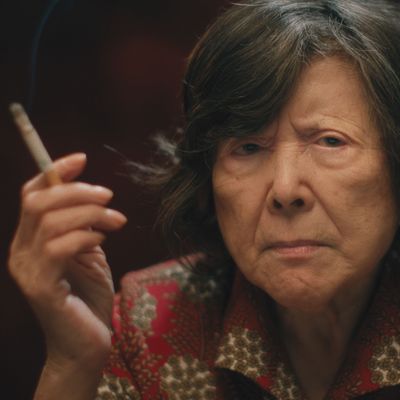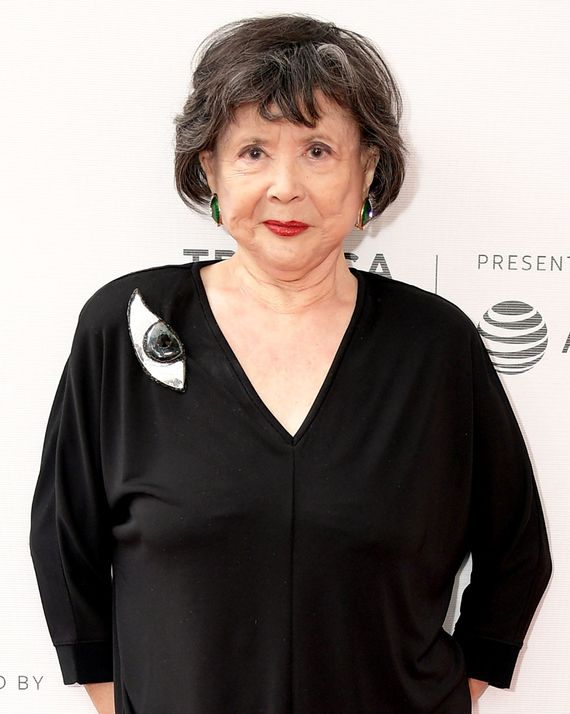
If you ever get to meet Tsai Chin, remember to speak clearly and project. The classically trained Chinese-born British actress, who’s had a stellar six-decade career on stage and screen, commands the same level of eloquence the industry demanded of her. It’s a fair expectation, considering that she’s been an acting instructor since the early 1960s and trains her students to speak in an operatic voice. That’s part of the reason why her most iconic film roles — including the unwavering Lindo Jong in The Joy Luck Club, the steely Auntie in Memoirs of a Geisha, and the beguiling Bond Girl, Ling, in You Only Live Twice — continue to resonate with audiences: They are fiercely self assured.
When I slid up next to Tsai Chin at a table at the Little Park Restaurant in New York City — where she was wearing an animal-print blouse, chic black pants, and impeccable lavender eyeshadow with red lips — I was eager to hear all about her new title role in Lucky Grandma. It’s a hybrid genre film that centers her as a stubborn, chain-smoking grandmother who wins and loses big at a casino only to end up stumbling across and seizing dirty money, which she discovers the hard way belongs to a dangerous gang. (The movie premiered at this year’s Tribeca Film Festival as a product of its Untold Stories initiative.) And we did talk about her experience working on it with director and co-writer Sasie Sealy, but what Chin really wanted to do was tell me some stories. “Actors love to tell stories.”
Throughout our conversation, Tsai Chin opened up to Vulture about being mistaken for a stereotypically subservient woman early in her career, turning down Japanese-speaking roles, why she cherishes her freedom and independence, and how she feels about “The Blonde Fatso” in the White House.
You have been acting for 62 years with many veteran directors. What made you want to work with Sasie on her first dramatic feature?
Well, because I don’t think there’s a film that’s been written for anybody female where they’re in every scene. And she’s not totally unlike me. She’s a pretty difficult person, and I’m putting it rather politely.
How is she difficult?
She fights me, which is good. I mean, I respect her. But there are times when I said “no.” Sometimes she admits that I’m right. I have more experience than her and I am more than twice her age. Both of us wanted to kill each other. I asked her later, “When did you want to kill me most?” She’s like, “You know in that scene? That’s when I really wanted to kill you.” I said, “Yeah, well the other one is when I wanted to kill you.”
Have your many experiences as an actor given you a certain amount of power to push back now or has that always been something you’ve had in you?
I always tell my students that I’m teaching them to be more confident. That’s why you come to acting class. I say, “If you aim at a tall tree, you may hit a bush. If you aim at a bush, you’ll hit that floor.” I find that some actors just don’t try enough. They may not like it when I say that [She mimics a face of disapproval].
Does it matter to you whether people like you?
No. As I get older, I care less and less. What are they going to do to me? Are they going to kill me? I’m going to die soon anyway! My whole thing is always about freedom and independence. Most people — a lot of people care about that. Well, not Americans because America’s not perfect. How much do you know about The Blonde Fatso?
Too many horrible things.
See, a lot of people think freedom means you can do anything you want. That’s not true. The more freedom you have, the more responsibility you have. My life has always been about freedom and independence. And in some ways, acting has too. What is so great about acting is that after 62 years, suddenly the technique is in you already. You don’t have to think about it anymore. Suddenly you’re free.
How much of what you know as freedom was passed down by your mother [Lilian Qiu]?
My mother married my father in 1920s and she was disinherited. She was so brave. I’ve learned everything from her. I mean, she’s kind of a legend too because she taught me everything about being a woman, maybe to be too independent. They call me Mrs. Chin. Don’t call me Mrs.! I don’t want to be a Mrs.
Did you think that getting married again would strip away your independence?
I don’t like to be called “Mrs.” because I am not married, and I only belong to myself. I admire and respect people who have been successfully married for a long time, but I cannot do it. So I decided to never marry again.
Is that why you’ve been drawn to so many independent characters like Grandma and Lindo in The Joy Luck Club?
I have to give credit to my mother because she taught me as a girl [to speak up]. That became very useful as an actor, especially a female actor in the West — well, in China too, because there is no difference. If you’re in the West and you’re Asian and small and pretty, they think you must be very submissive [She laughs]. What a shock they had [when they met me]. It’s quite powerful for women to use the word “no.”
It’s been more than fifty years since you were one of the first Asian Bond Girls in You Only Live Twice. Did you think at the time that it would help move the needle as far as how Asian women were viewed on screen?
I never thought it was anything until now, because everybody started saying it’s so great.
You didn’t see its significance?
Well, okay, it’s very popular and that’s it. But [She feigns being sleep]. Anyway, I’m not playing Aki [the more prominent Bond Girl in the film, played by Akiko Wakabayashi]. That would have intimidated me because it was shot in Japan and you needed to know Japanese and I don’t. The director [Lewis Gilbert] is a very good friend of mine who just died a year ago.
The funny thing about Memoirs of a Geisha is, I was offered another bigger role and turned it down. I was 68 years old, so that was already quite a phenomenon. And by that time, I was too scared to not be able to speak Japanese. Chinese is difficult enough.
Speaking of Memoirs of a Geisha and Bond Girls, how do you think Asian female sexuality has evolved on screen?
In the beginning it was Madame Butterfly, of which I was in a production in 1989 [in London’s West End]. It’s like your race [African-American]. There is a period when the Europeans, or let’s say Caucasians — I hate this way of saying “white” or “black” — were at their most powerful. In some ways, it’s always foreigners, the outsiders, the other that the stronger people always try to make into [She mimics a shrinking violet] nothing. So they think Chinese people are all like that. Can you imagine me being that way?
[Laughs] Not in the slightest.
They don’t know me anyway. My mother definitely wasn’t like that. She was bilingual, which helps.
Do you think that the stage was more progressive in that way than onscreen narratives?
I think my best roles are always on stage. That’s why I advocate for them so much. I’m a stage actor. I always tell young actors that they must do as many stage performances as they can — New York if possible, if not Los Angeles or London. I was brought up in London. My young adult life began there. It is the mecca of theater. I come from a theater background, so my best roles are Hester Prynne [in 1977’s The Scarlet Letter] and Clytemnestra [in 1977’s The Orestaia and Agamemnon]. These are very strong [characters]. But of course I’ve also been in The World of Suzie Wong [in the title role as a Chinese sex worker], which the press didn’t let me forget. I never played her as a victim. I never played any woman as a victim, because I didn’t want anyone to treat me like a victim.
What do you love about the theater as opposed to onscreen portrayals?
Theater is an actor’s medium and it’s getting more technical too. But … [Lucky Grandma producer Krista Parris laughs across the restaurant] Is that Krista? KRISTA! I am being interviewed and I can hear you laughing two miles away! I can recognize your laugh in a railway station! I can always find you!
Where was I?
[Laughs] You were talking about the stage and what you love about it.
You can control the audience. You can make the audience so happy one minute, and so sad the next minute. In film, it’s up to the directors to cut it well. Sometimes an actor may not give a very good performance, but the editor does a good job.
How much did you learn about discipline as an actor from your father [Zhou Xinfang]?
My father was one of — and still is — the greatest grand masters of Peking Opera in China. That’s a big responsibility, but I definitely have seen the sky. I mean, I’m never going to get there but at least I know where to aim.
Is that what inspires you to still act today?
Actors don’t retire. It retires you. One day nobody’s going to offer me roles. I’m already 80. Well, there is Betty White. I discovered that two other women years ago had 80-year-old careers. They say men are stronger than women. I say, “Oh yeah? Then how come we don’t die? You die early!” All of them. When do we die before?
Fair point. How would you like people to remember you?
Shakespeare said a long time ago, “Life’s but a walking shadow, a poor player that struts and frets his hour upon the stage. And then is heard no more.” You are only famous for ten years, unless you’re a superstar. Because another generation comes through and you’re forgotten.


